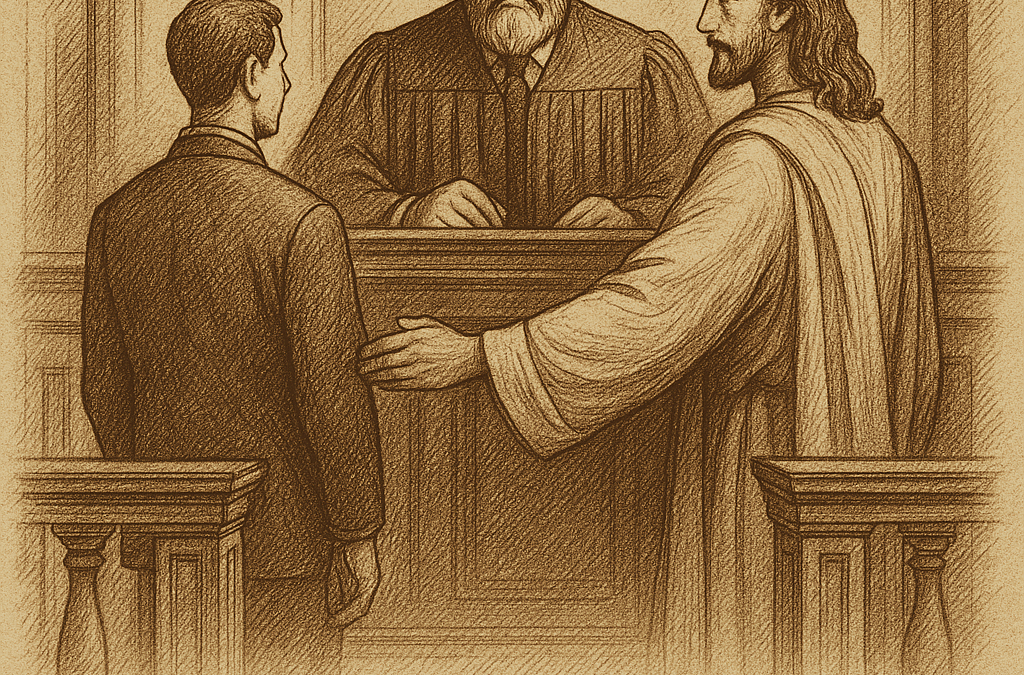Understanding Justification through the Eyes of Scripture
Seen Through The Eyes of Paul’s Letter to the Saints in Rome
The Analogy: The Courtroom of Eternity
Imagine yourself in a courtroom—not just any, but the Supreme Court of Heaven. God is the Judge, completely just and morally perfect. You are the defendant, and the charges against you are undeniable. Every sin—secret or known, internal or external—is recorded as evidence.
The gavel is raised, and the verdict is clear: Guilty.
But then something unexpected happens. The Judge does not sentence you—instead, He descends from the bench and offers Himself in your place, paying your penalty. Then, He turns to you and says, “You are justified.”
This is justification: God declares you righteous, not because of what you’ve done, but because of what He has done THROUGH HIMSELF being Jesus THE Christ.
What Is Justification?
Justification is a legal term drawn from courtrooms. It doesn’t mean that the accused is innocent of the charges—it means that the accused has been declared righteous by the judge. In the Bible, this declaration is made by God, not based on merit, but on faith in Jesus Christ.
“since all have sinned and fall short of the glory of God; they are now justified by his grace as a gift, through the redemption that is in Christ Jesus, whom God put forward as a sacrifice of atonement by his blood, effective through faith. He did this to show his righteousness, because in his divine forbearance he had passed over the sins previously committed; it was to prove at the present time that he himself is righteous and that he justifies the one who has faith in Jesus.” —Romans 3:23–26
Just as in our courtroom analogy, God doesn’t dismiss your case; He takes it upon Himself. Through Jesus’ sacrificial death, your debt is paid, and your status is legally changed. That’s justification.
Justification Is Not…
To clear up confusion, let’s establish what justification is not:
-
It is not excusing sin or pretending it didn’t happen.
-
It is not a gradual process like sanctification.
-
It is not based on works or efforts to earn God’s approval.
Scripture makes it plain:
“For we hold that a person is justified by faith apart from works prescribed by the law.” —Romans 3:28
God does not say, “You did your best, so I’ll overlook your sin.” That would compromise justice. Instead, He satisfies justice by offering Himself in your place.
“He himself bore our sins in his body on the cross, so that, having died to sins, we might live for righteousness; by his wounds you have been healed.” —1 Peter 2:24
How Does One Receive Justification?
In our divine courtroom, the gavel has not yet dropped. You’re still awaiting your sentence. But justification does not come by defending yourself—it comes by faith in what Jesus already did.
“Therefore, since we are justified by faith, we have peace with God through our Lord Jesus Christ, through whom we have obtained access to this grace in which we stand; and we boast in our hope of sharing the glory of God.” —Romans 5:1–2
Faith is not wishful thinking; it is your acceptance of God’s grace and His way of salvation. It means confessing, “I’m guilty, but I trust in the One who paid for me.”
The Ongoing Impact of Being Justified
When God declares you justified, it affects every area of life. You don’t leave the courtroom with shame—you walk out with a new identity. You are now accepted, not accused.
“There is therefore now no condemnation for those who are in Christ Jesus.” —Romans 8:1
The enemy may try to bring up your past, but heaven’s Judge already ruled in your favor.
“Who will bring any charge against God’s elect? It is God who justifies.” —Romans 8:33
“Who is to condemn? It is Christ Jesus, who died, yes, who was raised, who is at the right hand of God, who indeed intercedes for us.” —Romans 8:34
You are not justified by emotion, popularity, or moral performance. You are justified by divine decree, by grace, through faith.
Conclusion: Let the Verdict Stand
Justification is not a feeling—it is a heavenly verdict.
-
You were guilty.
-
God, the righteous Judge, took your place.
-
He declared you righteous based on Christ’s atonement.
-
You receive that verdict by faith.
-
Now you are free—truly free.
Let this truth silence every inner voice of doubt. Let the divine verdict echo louder than the accusations of the past.
“He saved us, not because of any works of righteousness that we had done, but according to his mercy, through the water of rebirth and renewal by the Holy Spirit.” —Titus 3:5
You are no longer on trial. The Judge has ruled. Let the verdict stand.
Grace & Peace
FaithQuake on FaceBook
Dr. John Roberts THD

